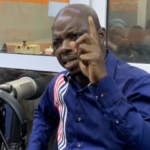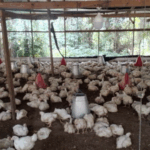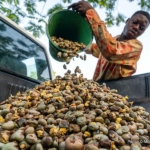
Ghana is a land where respect is woven into our culture like kente threads – vivid, enduring and sacred.
From the days of our forefathers, reverence for authority, elders and institutions has defined who we are. In our villages, no child dared to call an elder a fool.
Unfortunately, politics of convenience is gradually eroding some of these sacred cultures the nation has imbued with its people.
One individual has stood out not for wisdom, nor leadership, but for a crude trade in insults:
the Bono Regional Chairman of the New Patriotic Party (NPP), Mr Kwame Baffoe popularly known as Abronye DC.
He continues to engage in politics of convenience and vitriolic attacks on anybody including his own party leaders he thinks has not done something right. This has also not spared him numerous court cases and criminal charges and investigations.
Claims and lies
After the successful, incident-free policing of the Akwatia by-election, an event praised across the nation and beyond, Abronye had the perfect opportunity to demonstrate statesmanship. Instead, he opened his mouth, and what poured out were not ideas, not critique, but poison– “foolish fool,” “madman,” and a string of unprintable slurs hurled at the Inspector-General of Police (IGP), Mr Christian Tetteh Yohuno in a video which has since gone viral.
In the said video, Abronye accused the IGP of corruption, colluding with the ruling National Democratic Congress (NDC) through a meeting he claims was arranged between the IGP and the party and the police’s failure to act when some NPP officials were attacked during the Akwatia by-election last week.
It is important to put on record that all the claims he made were unfounded.
For instance, the Eastern South Regional Police Command confirmed in a press statement that the Akwatia District Police Command had initiated a probe into an alleged assault on the Third Vice Chairman of the NPP, Alhaji Masawudu Osman who had been issued with a police medical form to seek treatment at a hospital.
The case has since been forwarded to the Attorney General’s Department for advice.
Clearly, this was not free speech. This was abuse. And under Ghana’s laws, insulting behaviour is not only immoral but criminal.
The police, acting rightly, invited him to explain himself. Instead of facing this squarely, Abronye chose to cloak himself in victimhood. He twisted accountability into persecution. And now, shockingly, he is petitioning foreign embassies in Ghana including the USA, UK, Canada, Spain and Côte d’Ivoire for political asylum.
The action by the police is neither persecution nor oppression as he claims.
‘Don’t be deceived’
This is not the story of a political prisoner. This is the story of a man who has lived by insults, profited from abuse and now seeks to evade the consequences by crying wolf to the international community.
Ghanaians must not be deceived.
Abronye is no stranger to controversy. If words were weapons, his arsenal would be overflowing with bullets of venom.
His political career has been marked less by policy ideas and more of vitriolic attacks.
Even his own party, the NPP, once had to distance itself from him when he launched a disgraceful tirade against Archbishop Nicholas Duncan Williams, a man revered by many in the country.
Not to talk of the insults he hurled at his own party stalwart, Mr Kennedy Agyapong.
Journalists, civil society actors, political opponents– all have tasted Abronye’s acidic tongue.
His speeches, often broadcast on radio and social media, are littered with slurs and unfounded accusations. To him, disagreement is not to be debated, it is to be cursed.
But Abronye, instead of acknowledging the consequences of his mouth, chose the path of deception. He told Ghanaians he was being politically targeted. He told foreign embassies he was a victim of persecution. He painted himself as a freedom fighter under siege. Let us not be fooled.
No need for asylum
Abronye does not need any asylum as he has been invited for his criminal insults by the police. So if he believes he is innocent, he can defend himself in the law courts.
His own behaviour shows he anticipated police action. He hurled insults spewed falsehood knowing consequences would follow, so he could play victim later.
We call on all the foreign embassies and diplomatic missions in Ghana not to pay heed or grant asylum to individuals such as Abronye who engage in politics of insults and inflame passions.
We must, as a people, reject the normalisation of insults in politics. We must teach our children that leadership is about service, not slander; about ideas, not abuse.
We must protect our pride and protect our sovereignty as nation. And we must insist that those who live by insults in Ghana must answer for them in Ghana—not hide under the flag of asylum elsewhere.
Ghanaians must unite in saying: No more to politics of insults and condemn actions such as those of Abronye. The law must continue to bite anyone who engages in such acts.
Neenyi Essiful
essifulneenyi@gmail.com




